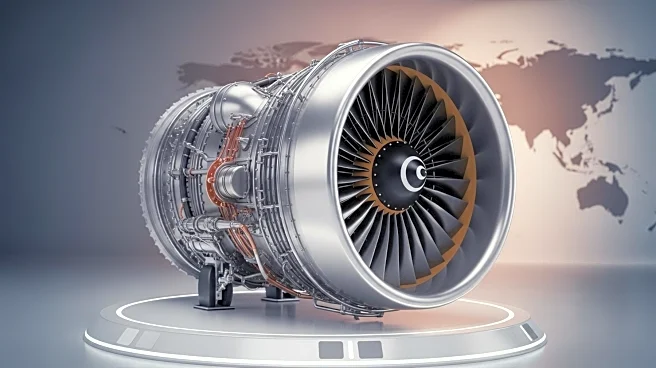What's Happening?
The export of General Electric F110 engines to Turkey for the Turkish Aerospace Industries Kaan fighter has been stalled, according to Turkey's Foreign Affairs Minister. The delay is attributed to the Countering America's Adversaries Through Sanctions Act (CAATSA), which was imposed on Turkey following its purchase of a Russian-made air defense system. The Turkish Foreign Affairs Minister highlighted the systemic problem of legal restrictions between NATO allies, which prevents them from purchasing from each other. Despite the stalled export licenses, Turkey has received F110 engines for Kaan prototypes, with the next prototype expected to fly in April 2026. Turkey is also developing a homegrown engine, the TF35000, to achieve independence in jet engines.
Why It's Important?
The stalled export of F110 engines to Turkey underscores the complexities of international defense relations and the impact of CAATSA on U.S.-Turkey ties. This situation highlights the challenges faced by NATO allies in balancing defense needs with geopolitical considerations. The delay in engine exports could affect Turkey's defense capabilities and its plans for the Kaan fighter production. Additionally, Turkey's efforts to develop indigenous engine technology reflect a broader trend of countries seeking self-sufficiency in defense capabilities, which could alter global defense industry dynamics.
What's Next?
Turkey is expected to continue its efforts to develop the TF35000 engine, aiming for a preliminary design review by the end of 2025 and installation in a Kaan prototype by 2029. Meanwhile, the U.S. Congress may still approve the export licenses for the F110 engines, which would allow production of early block standard aircraft to begin. The ongoing situation may prompt Turkey to explore alternative strategies within the international defense system, potentially affecting its alliances and defense procurement strategies.
Beyond the Headlines
The stalled engine export highlights the ethical and strategic dilemmas faced by countries in defense procurement, particularly when geopolitical tensions influence trade and military alliances. Turkey's pursuit of indigenous engine technology could lead to long-term shifts in its defense industry, promoting technological innovation and reducing reliance on foreign suppliers. This development may also influence other countries to invest in domestic defense capabilities, reshaping global defense industry landscapes.









